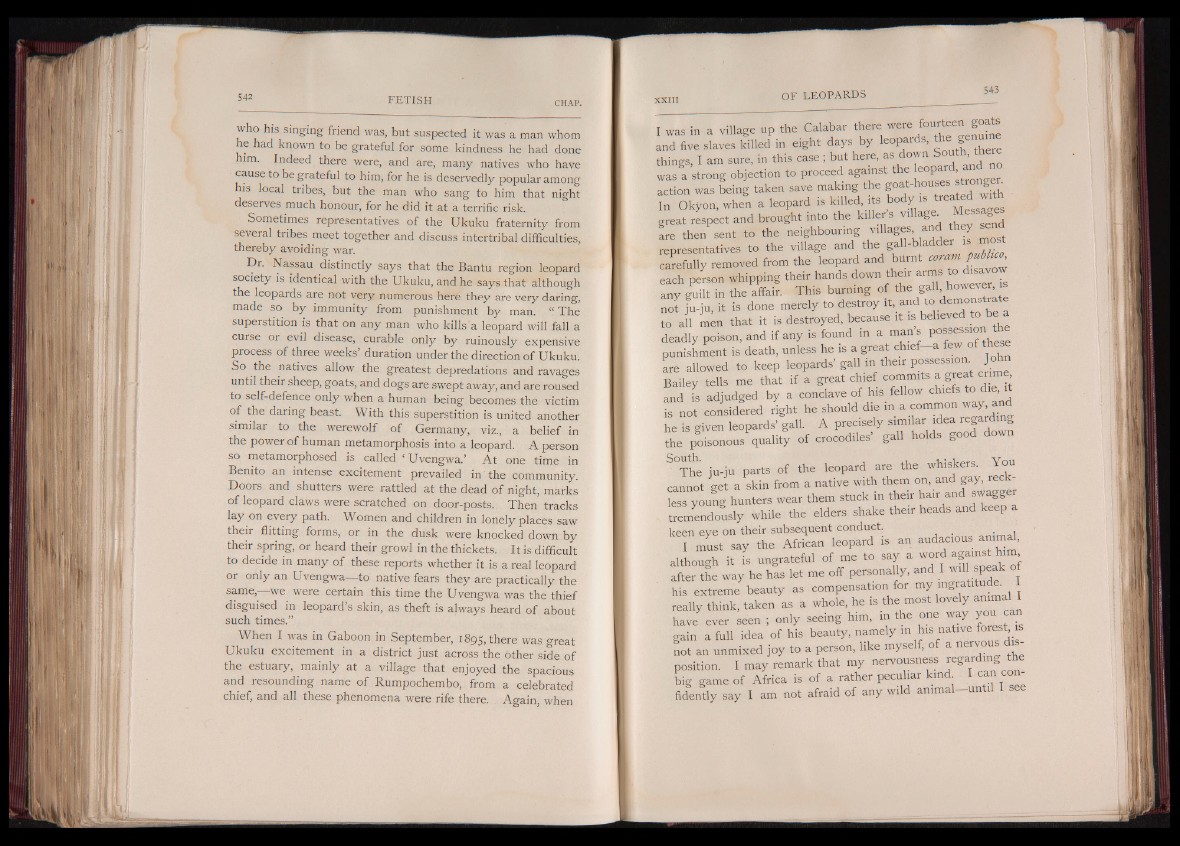
who his singing friend was, but suspected it was a man whom
he had known to be grateful for some kindness he had done
im. Indeed there were, and are, many natives who have
cause to be grateful to him, for he is deservedly popular among
his local tribes, but the man who sang to him that night
deserves much honour, for he did it at a terrific risk.
Sometimes representatives o f the Ukuku fraternity from
several tribes meet together and discuss intertribal difficulties,
thereby avoiding war.
Dr. Nassau distinctly says that the Bantu region leopard
society is identical with the Ukuku, and he says that although
the leopards are not very numerous here they are very daring,
made so by immunity from punishment by man. “ The
superstition is that on any man who kills a leopard will fall a
curse or evil disease, curable only by ruinously expensive
process of three weeks’ duration under the direction of Ukuku.
So the natives allow the greatest depredations and ravages
until their sheep, goats, and dogs are swept away, and are roused
to self-defence only when a human being becomes the victim
of the daring beast. With this superstition is united another
similar to the werewolf of Germany, viz., a belief in
the power of human metamorphosis into a leopard. A person
so metamorphosed is called ‘ Uvengwa.’ A t one time in
Benito an intense excitement prevailed in the community.
Doors and shutters were rattled at the dead of night, marks
of leopard claws were scratched on door-posts. Then tracks
lay on every path. Women and children in lonely places saw
their flitting forms, or in the dusk were knocked down by
their spring, or heard their growl in the thickets. It is difficult
to decide in many of these reports whether it is a real leopard
or only an Uvengwa— to native fears they are practically the
same, we were certain this time the Uvengwa was the thief
disguised in leopard’s skin, as theft is always heard of about
such times.”
When I was in Gaboon in September, 1895, there was great
Ukuku excitement in a district just across the other side of
the estuary, mainly at a village that enjoyed the spacious
and resounding name of Rumpochembo, from a celebrated
chief, and all these phenomena were rife there. Again, when
I was in a village up the Calabar there were fourte g
and five slaves killed in eight days by leopards, «
things, I am sure, in this case; but here, as down Soutkthere
was a strong objection to proceed against the leopar >
action was being taken save making the goa - ou with
In Okyon, when a leopard is killed, its o y■ ivies saves
great respect and brought into the killer’s village^ Messages
are then sent to the neighbouring villages and y
representatives to the village and the gall-bladder
carefully removed from the leopard and biirnt
each person whipping their hands down their arms to disavow
any guilt in the affair. This burning of the gall however,
noi fu-ju, it is done merely to destroy it, and to demonstrate
to J l men that it is destroyed, b ecau se i t is beheved to be a
deadly poison, and if any is found in a mans p o s se s s* .th e
punishment is death, unless he is a great ch ie f-a few of th
are allowed to keep leopards’ gall in their possession John
Bailey tells me that if a great chief commits a great cnrn ,
and fs adjudged by a conclave of his fellow chiefs to die, it
is not considered right he should die m a common way an
he is given leopards’ gall. A precisely similar idea regardi g
the poisonous quality of crocodiles’ gall holds good down
S°The ju-ju parts of the leopard are the whiskers. You
cannot get a skin from a native with them on, and gay, rec
less young hunters wear them stuck in their Jam and swagg
- tremendously while the elders shake their heads and keep a
keen eve on their subsequent conduct. _
I must say the African leopard is an audacious animal,
although it is ungrateful of me to say a word
after the way he has let me off personally, and I will speak
his extreme beauty as compensation for my ingratitude,
really think, taken as a whole, he is the most lovely ammaU
have ever seen ; only seeing him, in the one way you can
gain a full idea of his beauty, namely m his native § f | | f f
not an unmixed joy to a person, like myself, of a nervous disposition.
I may remark that my nervousness regarding the
big game of Africa is of a rather peculiar kind I can co
fidently say I am not afraid of any wild animal— until I see